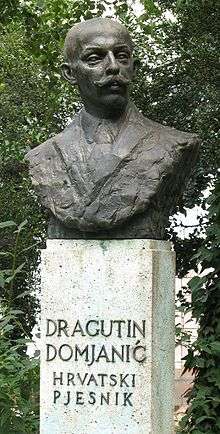Dragutin Domjanić
Dragutin Domjanić (12 September 1875 – 7 June 1933) was a Croatian poet.[1]
Dragutin Domjanić | |
|---|---|
 Domjanić's bust in Strossmayer Square, Zagreb | |
| Born | 12 September 1875 Krči, near Adamovec, Austro-Hungarian Empire |
| Died | 7 June 1933 (aged 57) Zagreb, Yugoslavia |
| Occupation | Poet |
| Language | Croatian |
| Nationality | Croat |
Domjanić was born in Krči, a village near the town of Sveti Ivan Zelina.[2] Having graduated law, he served as a judge in Zagreb and as a counsellor for Ban's Bench. He was a member of Yugoslav Academy of Sciences and Arts, the president of Matica hrvatska (1921–1926), and the president of Yugoslav PEN Club.[3] In a struggle between the "old" and the "young" in the framework of Croatian Modernism, he sides with the "young". He versified motifs such as spiritual love, intimacy of the nobility mansions, marquises and cavaliers of the past days. He fears the brutality of the present, mourns the world dying off, he is incredulous of new ideas.
His affection for the past directs him towards his mother tongue - Kajkavian. The most notable work of Domjanić is thus Kajkavian poem collection Kipci i popevke, and the poems "Fala" and "Popevke sam slagal", both set to music by Vlaho Paljetak.[4] Croatian composer Ivana Lang has in a similar manner set to music several Domjanić's poems. His lyrical expression, idyllic and sentimental, abounds both by the picturesqueness and musicality. He became the first writer in Croatian literature to achieve complete and artistically mature melodiousness and rhythmicity of the Croatian Kajkavian expression.
All of his poems were written in Kajkavian literary language, although his vernacular was Kajkavian dialect of Adamovec. He also wrote a number of literary accounts, and a few prosaic notes, chiefly in the spirit of his lyrical interests and stylistic manière.
He is also the other of less known "string puppet play" Petrica Kerempuh i spametni osel, in which he provides a critical and satirical account of Croatian intellectuals in the 1920s.
He died in Zagreb.
Works
- Pjesme (1909)
- Kipci i popevke (1917)
- V suncu i senci (1927)
- Po dragomu kraju (1933)
References
- Contemporary Croatian literature by Ante Kadic. Page 26.
- Repar 2017, p. 169.
- Repar 2017, p. 170.
- Repar 2017, pp. 176–178.
Sources
- Repar, Kristina (April 2017). "Poems by Dragutin Domjanić Set to Music" (PDF). Croatian Journal of Education. 19 (Sp. Ed. 1): 169–190. Retrieved 30 April 2018.CS1 maint: ref=harv (link)
| Cultural offices | ||
|---|---|---|
| Preceded by Fran Tućan |
President of Matica hrvatska 1921–1926 |
Succeeded by Albert Bazala |